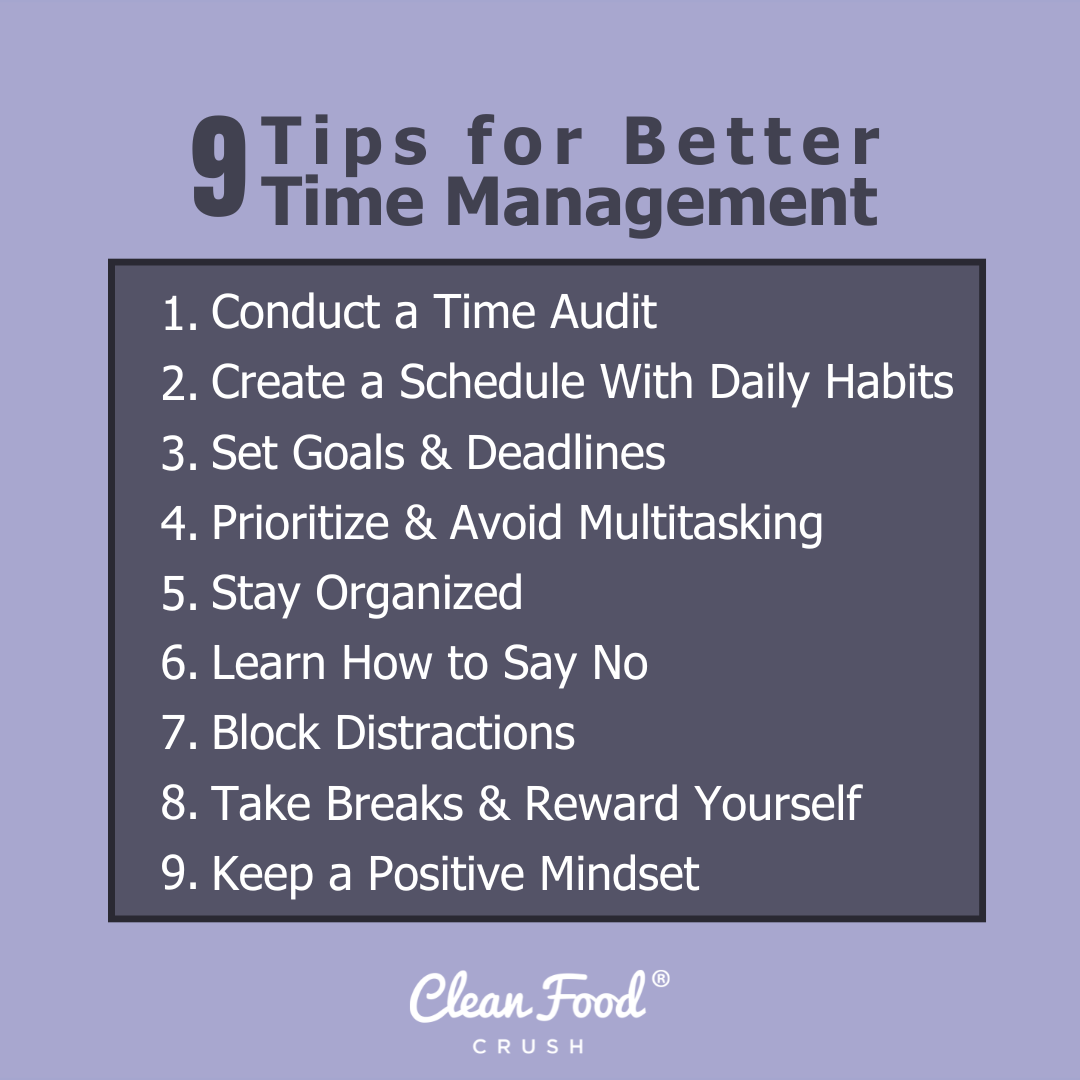This post contains affiliate links. Please see our disclosure policy.

Tips for Time Management
Summer vacation is nearing its end, and the busy season is just around the corner.
With so many things to juggle, such as work, school, appointments, extracurriculars, chores, cooking, working out, self-care, sleep, and more, life can feel overwhelming.
There’s not always time for everything!
That’s why time management is so important.
Learning how to effectively and efficiently plan your day, use your time, and maximize productivity can make life so much easier and more enjoyable.

Plus, there are several other benefits of time management, including:
-
Better Work Quality
-
Reduced Stress
-
Increased Energy
-
Reach Goals
-
Less Procrastination
-
Boosted Self-Confidence
-
More Time for Enjoyment
Here are 9 tips to help you manage your time more effectively:
1. Conduct a Time Audit
To manage your time well, you must know how you’re spending it. By tracking where you’re actually spending your time, you’ll be able to see patterns and habits. You may not even realize bad habits or how much time you spend looking at your phone, shopping, or doing something unproductive.
If you’re a visual person, create a little map or graph of how long you spend working, doing chores, running errands, cooking, enjoying leisurely activities, etc. You can start setting a schedule and new goals based on what you notice.
2. Create a Schedule With Daily Habits
Now that you know how you spend your time, you can create a new schedule to reallocate that time. Set yourself reasonable limits for how long you can spend on certain tasks. If you’ve been spending an hour on a task that really only takes half an hour, start by setting yourself a forty-five-minute time limit.
Maintaining and developing a list of specific things to be done each day and how long you need to do them is important. If you need help, check out our post on Reaching Your “Healthy Habits” Goals With an Action Plan.
3. Set Goals & Deadlines
For each project you may have, set yourself a deadline to finish the project. Make it reasonable, and if you need to, build your weekly schedule around those deadlines.
Also, define your goals, both long-term and short-term! What do you want to accomplish in a week, a month, a year? Set incremental smaller goals within a larger goal to make a large project more manageable. One chunk at a time.
4. Prioritize & Avoid Multitasking
Now that you have a schedule and list of goals try organizing them based on which are most important and urgent. Prioritize what you need to do immediately because of an upcoming deadline or things you can schedule for later. If you can, tackle the most difficult task first! Having a big, overwhelming task out of the way will make everything else on your To-Do seem more manageable.
Just be sure to concentrate on one task at a time. Multitasking is often less efficient than focusing on one thing at a time.

5. Stay Organized
Getting and staying organized can be more difficult than it sounds, but it really does make a huge difference. Clean your desk and eliminate clutter around your house. Set up a file system on your computer. Utilize Tupperware and meal prep for the week, and have the kids’ lunches planned ahead of time. An organized environment helps decrease stress and anxiety, which will make managing your time much easier.
Here are some organization and destressing tips, specifically for the back-to-school season, to help you!
6. Learn How to Say No
One of the quickest ways to overfill your schedule is to say yes to anything someone asks you to do. You don’t have to agree to everything; you only have so much time and energy. Recognize what you can and should do and delegate where you can.
Also, don’t be afraid to ask for help! Whether at work or home, if you have people you can rely on, lean on them when you need to!
7. Block Distractions
Distractions, temptations, and time sucks are the mortal enemy of time management. Identify the biggest distractions in your life and find creative ways to block them.
If you’re prone to taking unnecessary naps, work at a desk away from your couch and bed.
If you’re tempted by social media, put your phone in another room or download an app or extension that helps block certain tempting sites or social media.
Self-discipline is your best friend!
8. Take Breaks & Reward Yourself
Don’t be afraid to take small breaks throughout the day. It may seem counter-productive, but if you work nonstop all day, you’ll burn out and be less productive while you are working. Taking small moments to yourself helps you avoid exhaustion and overexertion. After all, self-care is incredibly important!
Reward yourself when you reach a goal or meet a deadline and celebrate your progress – big or small!
Rewards are a great source of motivation and can work as moments of rest as well. Some examples of small rewards are:
-
Enjoy your favorite treat as a snack
-
Go for a short walk and enjoy the fresh air
-
Read or listen to a chapter of your book
-
Meditate or sit in silence for five minutes
-
Take a bath
9. Keep a Positive Mindset
Always remember to be kind to yourself and keep things in perspective. It’s important to have a positive mindset, even if you don’t meet a goal when you want to. One mistake or missed deadline isn’t the end of the world. Keep going, and be patient!
There’s a reason the quote “so much to do, so little time” is so relatable! Life often feels like too much. That’s why stepping back and reassessing how you spend your time is so important.
Do you have any tips for managing your time? Let us know in the comments below!


















